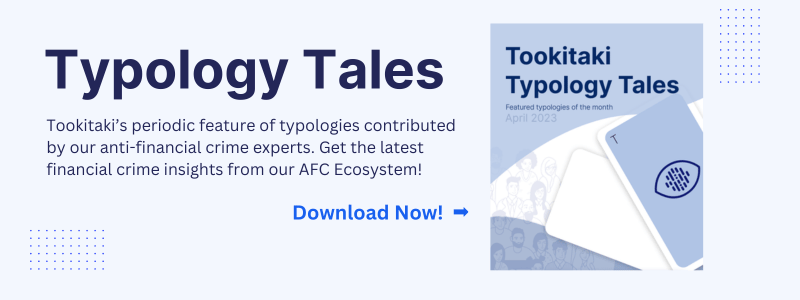In the intricate world of financial transactions, the battle against money laundering and terrorist financing (AML/CFT) has perpetually evolved, presenting a labyrinth of challenges that intertwine with the dynamic nature of financial crime. The current AML/CFT landscape is not only being shaped by the traditional methods of illicit money flows but is also being constantly disrupted by innovative criminal tactics that leverage technological advancements.
In an era where data is synonymous with power, collaborative analytics and data pooling emerge as potent weapons in dismantling the fortresses built by financial criminals. Collaborative analytics refers to the collective effort of various entities to analyze data patterns, identify anomalies, and derive actionable insights to mitigate financial crime. On the other hand, data pooling is the practice of aggregating data from diverse sources, providing a richer, more holistic view of transaction patterns, thereby enhancing the ability to detect anomalous activities. Together, they forge a robust mechanism that amplifies the capability to discern, understand, and counteract illicit financial flows.
No institution, regardless of its size or capability, can single-handedly navigate the treacherous waters of financial crime. It is through the amalgamation of experiences, insights, and data from various global entities that the financial sector can construct a formidable defence against the nefarious undertakings of money launderers and terrorist financiers. The collective vigilance not only enhances the detection capabilities but also fortifies preventive measures, ensuring a more secure and resilient financial ecosystem.
The Rising Tide of Financial Crime: A Call for Collective Action
As the financial landscape becomes increasingly digitized and globalized, the specter of financial crime looms larger, casting a shadow over the integrity and stability of financial institutions worldwide. The nefarious networks of money launderers and financiers of terrorism have adeptly adapted to the digital age, crafting intricate schemes that often blur the lines between legitimate and illicit transactions.
Unmasking the Evolving Face of Financial Crime
The emerging financial crime typologies and techniques are as varied as they are innovative. From exploiting digital currencies and leveraging online platforms for layering transactions to utilizing trade-based money laundering schemes, criminals have demonstrated an astute ability to navigate the digital financial realm.
The advent of technologies such as blockchain, while heralded for its security features, has also been manipulated to obfuscate illicit financial flows through decentralized finance platforms and cryptocurrencies. These evolving techniques not only challenge the traditional approaches to AML/CFT but also necessitate a reevaluation and adaptation of existing preventive frameworks.
Unifying Forces: The Indispensable Need for Collaborative AML/CFT
In the face of such sophisticated and pervasive financial crime, a unified, collaborative approach in AML/CFT is not merely beneficial but utterly indispensable. The multifaceted nature of modern financial crime transcends borders, sectors, and individual institutional capabilities.
A siloed approach to AML/CFT is not only ineffective but also perilously myopic in the face of global financial crime networks. A unified strategy, which amalgamates the knowledge, expertise, and data from a myriad of entities across the globe, provides a more holistic, robust, and adaptive defense mechanism against the ever-evolving tactics of financial criminals.
Case Studies on the Impact of Collaborative Efforts
Exploring case studies from various sectors can shed light on the tangible impact of collaborative efforts in mitigating risks and combating illicit activities. For instance, the collaboration among various countries in the European Union, through platforms like Europol, has enabled the dismantling of numerous money laundering networks by pooling resources, intelligence, and expertise.
Similarly, in the healthcare sector, collaborative efforts among pharmaceutical companies, researchers, and governments have been pivotal in addressing challenges, such as the rapid development of COVID-19 vaccines. These instances underscore the potential of collaborative efforts in not only addressing but also preemptively mitigating risks and challenges through shared knowledge, resources, and coordinated action.
Unveiling the Potential of Collaborative Analytics in AML/CFT
In the intricate and covert world of financial crime, the ability to discern patterns, predict trends, and preemptively mitigate risks is paramount. Collaborative analytics emerges as a beacon in this endeavor, illuminating the obscured pathways through which illicit funds traverse. It not only enhances the visibility of transactional flows but also amplifies the collective capability to thwart financial criminals in their tracks.
Collaborative Analytics: A Symbiotic Approach to AML/CFT
Collaborative analytics can be defined as a synergistic approach wherein multiple entities share analytical resources, insights, and data to enhance their collective ability to analyze, understand, and act upon shared challenges. In the context of AML/CFT, collaborative analytics plays a pivotal role by enabling financial institutions, regulatory bodies, and other stakeholders to pool their analytical capabilities and data to identify, understand, and mitigate money laundering and terrorist financing risks more effectively. It transcends the limitations of individual capabilities, providing a more comprehensive, nuanced, and adaptive understanding of financial crime patterns and trends.
Steering the Ship with Data: The Impact of Data-Driven Decisions in AML/CFT
The impact of data-driven decisions in identifying and mitigating risks cannot be overstated. In the realm of AML/CFT, data-driven decisions enable institutions to move from a reactive stance to a more proactive, predictive approach in managing financial crime risks. By leveraging data analytics, institutions can identify emerging risks, discern patterns, and predict potential future trends in money laundering and terrorist financing activities.
This not only enhances their ability to mitigate risks but also enables them to allocate resources more effectively, streamline compliance processes, and enhance their overall AML/CFT framework. The integration of collaborative analytics further amplifies this impact by providing a richer, more diverse dataset from which to derive insights and inform decision-making.
Data Pooling: A Synchronized Approach to Enriching AML Typologies
In the ceaseless battle against financial crime, data stands as both a shield and a sword, enabling entities to defend against and counteract illicit financial activities. Data pooling, in this context, emerges as a potent strategy, allowing for a synchronized, collective approach towards understanding and mitigating the multifaceted challenges posed by money laundering and terrorist financing.
Diving into Data Pooling: A Crucial Ally in AML/CFT
Data pooling involves the aggregation of data from various sources, creating a consolidated reservoir of information that can be analyzed to derive more comprehensive and accurate insights. In the realm of AML/CFT, data pooling becomes particularly relevant as it allows for a more holistic view of transactional patterns, enabling entities to identify and understand complex money laundering schemes that may span across multiple institutions and jurisdictions.
By amalgamating data from various entities, data pooling enhances the collective ability to discern anomalies, identify emerging trends, and develop more effective strategies to combat financial crime.
Federated Database: A Beacon in Detecting and Preventing Financial Crime
A federated database in AML/CFT serves as a centralized repository that amalgamates typologies, patterns, and insights from various entities, enhancing the collective capability to detect and prevent financial crime. This database does not merely serve as a storage facility for data but acts as a dynamic, evolving entity that continually enriches its data through continuous inputs from various stakeholders.
In the context of AML/CFT, a federated database facilitates the sharing of knowledge and insights among financial institutions, regulatory bodies, and other stakeholders, ensuring that the collective understanding of financial crime is continually updated, refined, and enhanced. This, in turn, fortifies the collective defenses against financial crime, ensuring that strategies and actions are informed by the most current, comprehensive, and accurate data available.
The AFC Ecosystem and Collaborative AML/CFT Initiatives
In the intricate maze of global financial transactions, the AFC Ecosystem stands out as a lighthouse, guiding the collective efforts of various stakeholders in navigating through the murky waters of financial crime. It not only illuminates the obscured pathways of illicit financial flows but also serves as a conduit for knowledge, expertise, and data, fortifying the collective defenses against the multifaceted threats of money laundering and terrorist financing.
Navigating Through the AFC Ecosystem: A Confluence of Knowledge and Technology
The AFC Ecosystem is a community-based platform that serves as a nexus for the sharing of information, experiences, and best practices in the battle against financial crime. It is powered by the Typology Repository, a living database that is continually enriched by the collective experiences and knowledge of a global network of financial institutions, regulatory bodies, and risk consultants.
The AFC Ecosystem not only provides a repository of money laundering techniques and schemes but also facilitates a collaborative environment where stakeholders can share, validate, and integrate typologies, ensuring that the collective understanding of financial crime is continually updated, refined, and enhanced.
Pillars of Strength: The AFC Network and Typology Repository
The AFC Network and Typology Repository serve as the foundational pillars of the AFC Ecosystem, each playing a pivotal role in enhancing the collective capability to combat financial crime. The AFC Network is a global network of subject matter experts who contribute the latest typologies, ensuring that the Ecosystem is continually updated with the most current knowledge and insights in the field of AML/CFT.
On the other hand, the Typology Repository is the largest federated database of money laundering patterns, contributed and validated by experts, providing a ready-to-use, exhaustive database from which typologies can be searched and integrated into Anti Money Laundering Solutions (AMLS) with a single click, ensuring that stakeholders have access to a comprehensive, up-to-date repository of financial crime typologies.
-1.png?width=582&height=445&name=AFC%20(1)-1.png)
Fostering Unity in Diversity: The AFC Ecosystem’s Collaborative Environment
The AFC Ecosystem fosters a collaborative environment among financial institutions, regulatory bodies, and experts, facilitating the sharing of knowledge, insights, and best practices in a secure, privacy-protected manner. Members of the network can easily create and share their typologies using a user-friendly interface, without compromising any customer information.
This collaborative environment not only enhances the collective understanding of financial crime but also fortifies the collective defences against it, ensuring that stakeholders are equipped with the knowledge, insights, and tools necessary to effectively combat financial crime. Through this collaborative approach, the AFC Ecosystem ensures that the battle against financial crime is not fought in isolation but is a unified, collective effort that leverages the diverse expertise, experiences, and knowledge of various stakeholders.
Integrating Collaborative Analytics and Data Pooling into the AFC Ecosystem
In the intricate web of financial transactions, the integration of collaborative analytics and data pooling into the AFC Ecosystem emerges as a strategic move, amplifying its capabilities in unmasking and mitigating the risks associated with Anti-Money Laundering and Counter-Terrorist Financing (AML/CFT). This integration not only enhances the depth and breadth of the AFC Ecosystem’s Typology Repository but also fortifies the collective capabilities of its network in identifying, understanding, and mitigating financial crime.
Enhancing Collaborative Analytics within the AFC Network
Collaborative analytics within the AFC Network can be envisioned as a synergistic effort where experts from various domains converge to analyze, interpret, and derive insights from shared data. Strategies to enhance this include establishing a structured framework for data sharing and analytics, facilitating regular knowledge-sharing sessions, and leveraging advanced analytical tools and technologies.
Furthermore, creating a feedback loop within the network to continually refine and enhance analytical models and methodologies, and establishing a mechanism for recognizing and rewarding contributions can also amplify collaborative analytics within the AFC Network.
Enhancing the Typology Repository through Data Pooling
Data pooling from global contributors can significantly augment the Typology Repository, transforming it into a global tapestry of knowledge that reflects the collective experiences, insights, and expertise of various stakeholders. This involves not only pooling data related to known typologies and patterns of financial crime but also integrating insights, experiences, and case studies from various contributors, thereby ensuring that the repository is a comprehensive, dynamic entity that is continually enriched and updated.
Furthermore, establishing mechanisms for validating, verifying, and integrating contributed data, and creating a structured framework for categorizing and organizing pooled data can enhance the utility and efficacy of the Typology Repository.
Ensuring Data Privacy and Security in Collaborative Efforts
Ensuring data privacy and security is paramount in facilitating collaborative efforts within the AFC Ecosystem. This involves implementing robust data protection protocols, ensuring that shared data is anonymized and does not contain any Personally Identifiable Information (PII) or sensitive client information. Furthermore, establishing clear guidelines regarding data sharing, access, and usage, and implementing advanced encryption technologies to safeguard data during transmission and storage can fortify data privacy and security within the AFC Ecosystem.
Additionally, regular audits, assessments, and updates of data security protocols, and ensuring compliance with global data protection regulations, further strengthen the fortress of data privacy and security within the collaborative environment.
Future Prospects: Navigating the Path Ahead with Collaborative AML/CFT Initiatives
Embarking on a journey towards a future where collaborative initiatives shape the trajectory of Anti-Money Laundering and Counter-Terrorist Financing (AML/CFT) efforts, the AFC Ecosystem stands poised to navigate through uncharted territories. The integration of collaborative analytics and data pooling not only fortifies the present capabilities of the AFC Ecosystem but also sows the seeds for a future where collective efforts, shared knowledge, and unified strategies bolster the global defences against financial crime.
We call upon institutions, experts, regulatory bodies, and stakeholders across the spectrum to contribute to the AFC Ecosystem, to be part of a global network that stands united in the battle against financial crime. Your insights, experiences, knowledge, and expertise can significantly enhance the Typology Repository, ensuring that it is a dynamic, comprehensive, and up-to-date resource that reflects the collective wisdom, experiences, and expertise of the global community. Your contributions can amplify the impact, reach, and efficacy of the AFC Ecosystem, paving the path towards a future where collective efforts shape the trajectory of AML/CFT initiatives globally.
Anti-Financial Crime Compliance with Tookitaki?




